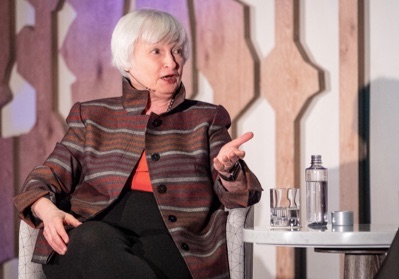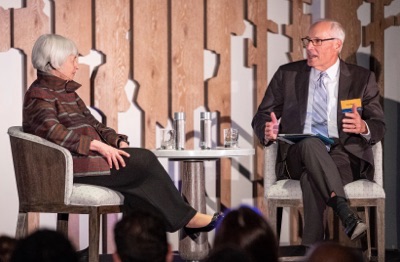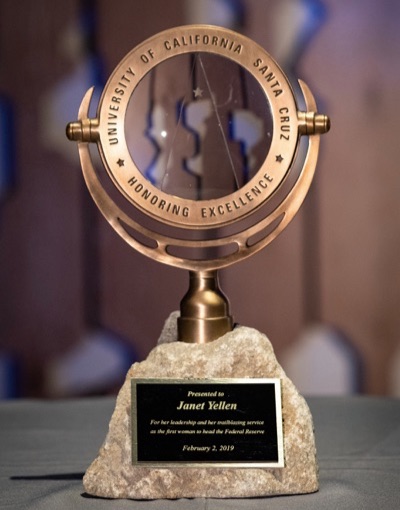Campus News
Former Federal Reserve Chair Janet Yellen receives Foundation Medal
UC Santa Cruz presented Former Federal Reserve Chair Janet Yellen with the Foundation Medal, the highest honor bestowed by the campus.



Former Federal Reserve Chair Janet Yellen was recognized Saturday for providing the “thoughtful and steady leadership” that helped the U.S. economy recover from the worst financial crisis since the Great Depression.
Those qualities were on display as Yellen held forth in a free-ranging conversation about wealth inequality, gender disparity, climate change, and—yes—monetary policy during a celebration that culminated with her receiving the UC Santa Cruz Foundation Medal.
“To my mind, Santa Cruz represents an ideal of what a university should be, a place where students come first and are supported to reach their highest goals for themselves and society,” Yellen said as she accepted the medal before an audience of 250 at the Hotel Nia in Menlo Park.
Yellen extolled the school’s commitment to creating a place “where students are safe to dream, and to find opportunities for transformative learning. A place where students can belong to a community that nurtures and values them as individuals, and enables them to achieve their highest aspirations. Even in modern and demanding times, UC Santa Cruz preserves and lives by these traditions.”
Yellen joins a distinguished group of brilliant, creative individuals who have been recognized with the Foundation Medal, the campus’s highest honor, which was first presented in 2003. The medal “recognizes individuals of exceptionally distinguished achievement whose work and contribution to society illustrate the ideals and vision of UC Santa Cruz.” Recipients include novelist Toni Morrison, architect Frank Gehry, chef Alice Waters, and astronomer Martin Rees. The medal itself is an impressive creation by artist Sean Monaghan (Kresge ’83, art) that features a base of limestone excavated from campus quarries, and an engraved bronze collar cast in our campus foundry that surrounds a rotating glass lens that is laminated, ground, and polished in the campus’s optical labs of UCO/Lick Observatory—the same shop that manufactures precision lenses for astronomical instruments around the world.
“The most powerful woman in the country”
In his opening remarks, Chancellor George Blumenthal said he’s heard Yellen referred to not only as the former chair of the Federal Reserve Board but also as a “feminist icon” and “the most powerful woman in the country.”
Before UC President Janet Napolitano introduced Yellen, she acknowledged Blumenthal’s 47-year career at UC Santa Cruz, including 13 years as chancellor. “In the history of this great university, that longevity and dedication truly stand out,” she said of Blumenthal, who has announced his intention to retire in June.
The program featured Yellen in conversation with Carl Walsh, a distinguished professor of economics at UC Santa Cruz and a leading expert in central banking and monetary policy.
Gender, wealth inequality, and climate change
Responding to a question from Walsh about the “gender diversity problem” in economics, Yellen said it should be a top priority. “It starts at the undergraduate level,” she said, noting that only about one-third of econ majors are women. In contrast to other scientific fields, she said, “We have seen no progress at all for women.”
Yellen, who took the helm of the Fed in 2014 as the economy was still recovering from the Great Recession, spoke often about unemployment and the central role work plays in creating economic wellbeing. Her parents survived the “horrors of mass joblessness” that was part of the Great Depression, and her interest in economic policy was matched by a desire to serve in government. Economists are needed “at the table” on a host of public policy issues, from wealth inequality to climate change, she said.
“Rising income inequality is probably the single most important economic issue facing the country,” she said. Since the mid-1980s, a large share of the U.S. population is “just not getting ahead,” said Yellen, citing structural factors such as technological change and globalization as the cause.
Climate change is another “urgent problem,” and Yellen outlined the benefits of a carbon tax, which she said economists “tend to love.” Taxing those who create greenhouse gas emissions and redistributing those new revenues on a per capita basis would benefit low-income people and could attract bipartisan support, she said, noting that using tax policy instead of regulations appeals to industry, as well.
Transparency, interest rates, independence, and crystal-ball gazing
Noting a cultural shift at the Fed toward more transparency and open communications, Walsh asked Yellen why that’s important.
Fed policy affects all Americans, which makes it imperative to explain what the bank is doing, what its goals are, and the progress its making, she said. It also makes the policies more effective if the public understands them, she said. “Communications is a policy tool,” said Yellen. “Once upon a time, central banks were immensely secretive organizations.”
Speaking of interest rates, Yellen said, “We’re in a new environment now. The normal level of interest rates is going to be low.” While the post-war short-term average was 4-4.5 percent, moving forward it will be no higher than 3 percent, she predicted.
The independence of the Federal Reserve Bank is important in part because the central bank can discipline fiscal authorities. Economies around the world with independent central banks perform better, said Yellen, adding that she “wasn’t surprised to see tweets” at the end of 2017, when the U.S. unemployment rate was “a very low 4 percent” and still Congress approved a “huge fiscal stimulus.”
“That’s not normal in a full-employment economy,” she recalled. “It’s a classic conflict situation. I was sorry to see commentary coming out of the White House.”
Yellen obliged Walsh’s request to “look into her crystal ball again” to identify the potential for a slowdown. Ticking off low unemployment and low inflation rates, she nevertheless conceded that it’s “conceivable” that inflation could gradually pick up over the next couple of years, prompting an interest-rate hike. But she hedged her bets, saying it is “by no means baked in the cake.”
Global threats, including a slowdown in China and Brexit, pose the biggest risks to continued economic expansion. “The Fed will respond to the economy,” she said.
Are we safe from another financial crisis?
Acknowledging that “hundreds of economists missed the financial crisis,” Walsh asked Yellen how much her decisions were based on technical advice versus “your intuition about the economy.”
“It really is kind of an indictment of the economics profession that nobody saw this financial crisis coming,” she said.
Yellen said the Fed’s top priority in the midst of the financial crisis was to get the economy and employment back on track, but in its aftermath, leaders realized they needed to develop a system of analysis and data collection to identify emerging threats to financial stability and to be “better positioned to stem threats to the financial system.”
“The truth is, banks were not managing their risks well,” said Yellen. “But fixing the financial system and making it safer is kind of a work in progress.”
Dodd-Frank, the Wall Street reform legislation adopted by Congress in 2010, created a road map to regulation which means the banking system today is in much better shape than before the crisis: Banks have more capital, higher-quality capital, and more liquidity, she said. They also are subjected to “stress tests” to assess their risk of failure, which Yellen called “a totally new technique.”
But as soon as regulators “tighten up on banks,” activity shifts to other sectors, and we have “inadequate tools to deal with risk,” she said. Following the Fed’s “extraordinary interventions” in 2008 to bail out institutions like AIG and Bear Stearns, Congress took away those tools. In what Yellen described as a “deal,” the Fed got a new tool to address the failure of non-banks, but it has yet to be tested.
“I think the Fed now lacks the power it would need to intervene in a crisis, and that concerns me,” she said, before summarizing her answer this way: “Glass half full: Lot of progress in a lot of important dimensions. Glass still half empty.”
She is heartened, however, that economists are trying to understand “systemic risk” theoretically—and doing empirical work to find ways to identify it.
A diverse audience
“That conversation was fantastic,” said Katharyne Mitchell, dean of the Division of Social Sciences at UC Santa Cruz. “Economists provide analysis that is central to all our challenges, and very often their work shapes public policy. It was great to see economics center stage. Janet Yellen is a wonderful leader and role model.”
Among those in attendance Saturday evening were seven AP macroeconomics students from Salinas High School and their teacher Brant Wilkinson. Earlier in the day, Yellen met with about three dozen UC Santa Cruz economics students—undergraduates, master’s, and doctoral students—for a question-and-answer session.
The evening was presented in partnership with the Sidhartha Maitra Memorial Lecture, with support from UC Santa Cruz Foundation Trustee Anu Luther and her husband Tom Kailath. Luther and Kailath hosted a small private dinner for Yellen, Napolitano, and special guests before the public event. Additional support was provided by the Sustainable Futures Fund, Melissa Phillips Liu, Mary E. Doyle, David E. Greenwood, and Cultivate Investments.